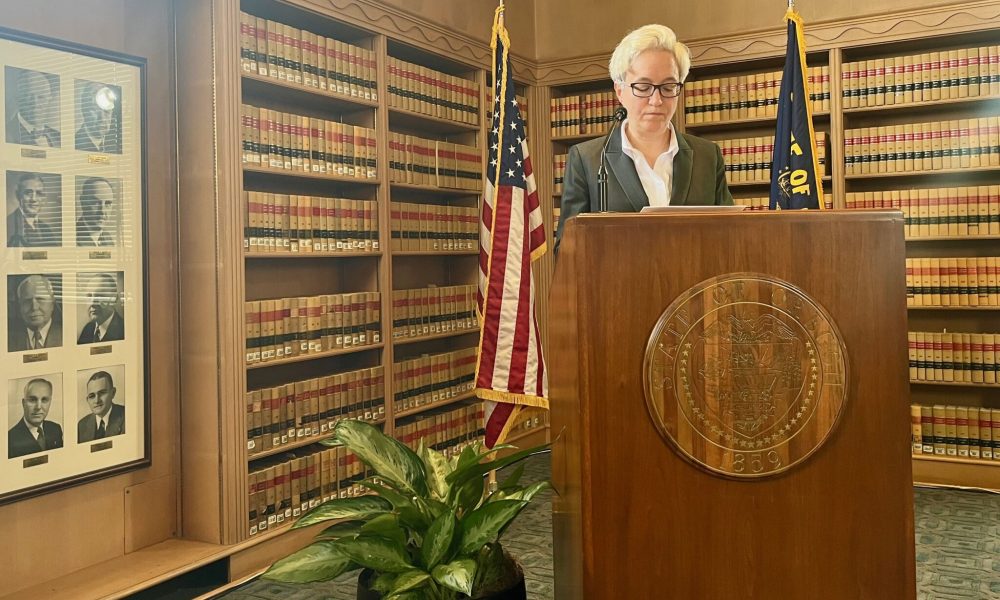Gov. Tina Kotek and legislative Democrats clashed Wednesday over spending, amplifying their first major conflict since she took office in January.
At a press conference marking her 100th day in office, Kotek doubled down on calls for the Legislature to divert hundreds of millions of dollars intended for the state’s savings account to instead pay for affordable housing, literacy programs and behavioral health.
But legislative budget writers, who are planning a tight budget with reductions to state agency funding and only about $325 million in discretionary funding for Democratic priorities including housing, homelessness, health care, literacy programs and public defense services, remain skeptical. In a separate news conference, Sen. Elizabeth Steiner, a Portland Democrat and co-chair of the Joint Ways and Means Committee, stressed the importance of keeping strong reserves to prepare for a pending recession.
At the State Library in Salem, Kotek said she’ll continue to push legislators to forego adding more money to the state’s reserve funds, which now total more than $2 billion. Diverting money from the state’s Rainy Day Fund in the current and upcoming two-year budget cycle would free up about $600 million, which Kotek said should be used for housing, literacy and behavioral health.
“A status quo budget, or worse, a cut budget, is completely unacceptable for the two years ahead of us,” Kotek said.
She’s specifically calling for at least $300 million in new spending on homelessness, in addition to the $200 million lawmakers approved earlier this year. Kotek’s also seeking $120 million for literacy programs – which she described as the minimum the state should spend as fewer than 30% of Oregon fourth graders demonstrate proficiency in reading on standardized tests.
And she’s seeking about $80 million in additional funding for the state’s behavioral health program, including money to recruit and retain behavioral health providers.
Kotek is also calling on legislators to use $1 billion in state bonding capacity – more than half the amount the state Treasury says the state can offer in bonds during the next two years – to build more affordable housing. Lawmakers on the Joint Transportation Committee want to commit $1 billion in bonds over the next eight years to replacing the Interstate 5 bridge over the Columbia River.
Kotek doesn’t plan to touch the state’s kicker tax rebate, paid out in the form of tax credits when revenues collected exceed official projections. Nearly $4 billion is expected to be returned to taxpayers when they file taxes next year, with a median credit of $790 and credits as high as $42,000 for the top 1% of earners who make more than $566,000 annually.

Legislators skeptical
Steiner, talking to reporters with Senate President Rob Wagner later on Wednesday, said the state needs fiscally conservative budgets.
“I have great faith in the U.S. economy, and we are long overdue from a historical perspective for an economic downturn,” she said.
State economists last year predicted that a “mild” recession would start this summer. They moved away from forecasting a recession during their February briefing, but still urged caution in the face of an uncertain economic climate. The ultimate budget for the next two years will be based on the May economic forecast, with a report and legislative briefing schedule for May 17.
Steiner recalled how the Beaverton School District in her legislative district had as many as 45 students in some classrooms during her first year in office in 2012 because it had spent its reserves. She said she never wanted to see something similar happen in the state, especially not under her watch as co-chair of the budget committee.
She said there could be an argument in favor of spending some money now to save money in the long term – something Steiner, a physician, compared to preventive care to stave off worse health conditions down the line – but said the state needs to be thoughtful.
“It’s a legitimate conversation,” she said. “ I’m not saying no, and I’m not saying I’m eager to do it.”
Wagner, D-Lake Oswego, said he pushed back on Kotek’s suggestions to divert money from rainy day funds in a conversation earlier this week. It’s too early to talk about dipping into reserves, he said.
“Rather than presuming that we’re going to look at particular funds to be able to fund essential public services, let’s figure out how much money we have,” he said.
House Speaker Dan Rayfield, D-Corvallis, reiterated during a meeting with reporters last week that he’s open to diverting some money from the state’s reserve funds. House Majority Leader Julie Fahey, D-Eugene, told the Capital Chronicle in a Wednesday interview that conservative budgeting is important, and the May forecast will determine how much can be spent.
“Regardless of what happens in the May forecast or the decisions around reserves, we’re committed to investing in those big priorities around housing and homelessness and behavioral health and education,” Fahey said. “The magnitude of those investments are dependent on what the May revenue forecast tells us.”
Nation’s least popular governor
Kotek’s hundredth day in office coincided with the release of a new poll from technology company Morning Consult, which found she’s the least popular governor in the country. Former Gov. Kate Brown repeatedly held that title.
Kotek is one of five governors with an approval rating below 50%. Four of the five, including Kotek, were elected last year: Democratic Gov. Katie Hobbs of Arizona and Republican Govs. Joe Lombardo of Nevada and Jim Pillen of Nebraska.
All four were rated low in part because people haven’t made up their minds. While 42% of respondents said they approved of Kotek, 39% said they disapproved. That left almost 20% of respondents saying they didn’t know about the governor or had no opinion.
Kotek said she hadn’t seen the Morning Consult poll, but that a prior survey from Portland-based DHM Research showed many Oregonians don’t know her.
“It’s going to take some time but we’ve only been at this 100 days,” she said. “I’m confident that as we continue to communicate with Oregonians in a variety of ways, they’ll get to know me better and I hope they’ll like what I’m doing.”
;occ
Oregon Capital Chronicle is part of States Newsroom, a network of news bureaus supported by grants and a coalition of donors as a 501c(3) public charity. Oregon Capital Chronicle maintains editorial independence. Contact Editor Lynne Terry for questions: [email protected]. Follow Oregon Capital Chronicle on Facebook and Twitter.
STORY TIP OR IDEA? Send an email to Salem Reporter’s news team: [email protected].

Julia Shumway is deputy editor of Oregon Capital Chronicle and has reported on government and politics in Iowa and Nebraska, spent time at the Bend Bulletin and most recently was a legislative reporter for the Arizona Capitol Times in Phoenix. An award-winning journalist, Julia most recently reported on the tangled efforts to audit the presidential results in Arizona.









